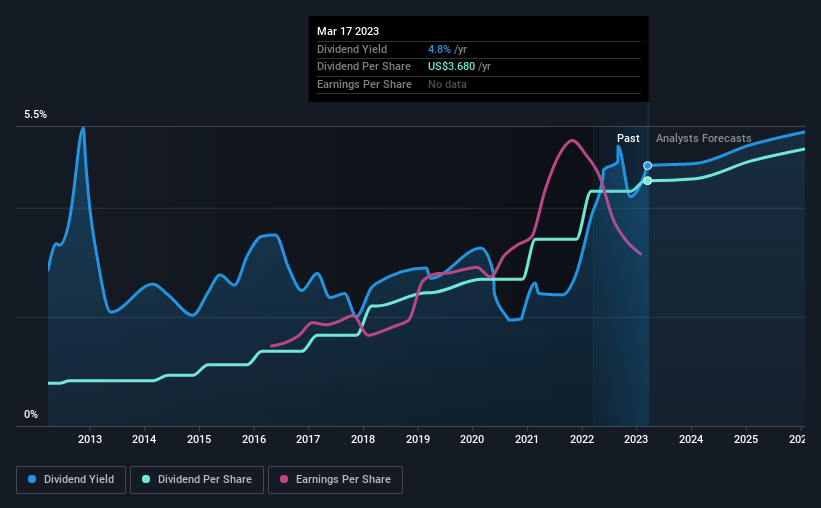Should Income Investors Look At Best Buy Co., Inc. (NYSE:BBY) Before Its Ex-Dividend?
Readers hoping to buy Best Buy Co., Inc. (NYSE:BBY) for its dividend will need to make their move shortly, as the stock is about to trade ex-dividend. The ex-dividend date is one business day before the record date, which is the cut-off date for shareholders to be present on the company's books to be eligible for a dividend payment. The ex-dividend date is important as the process of settlement involves two full business days. So if you miss that date, you would not show up on the company's books on the record date. In other words, investors can purchase Best Buy's shares before the 22nd of March in order to be eligible for the dividend, which will be paid on the 13th of April.
The company's next dividend payment will be US$0.92 per share, and in the last 12 months, the company paid a total of US$3.68 per share. Looking at the last 12 months of distributions, Best Buy has a trailing yield of approximately 4.8% on its current stock price of $77.09. Dividends are an important source of income to many shareholders, but the health of the business is crucial to maintaining those dividends. That's why we should always check whether the dividend payments appear sustainable, and if the company is growing.
Check out our latest analysis for Best Buy
If a company pays out more in dividends than it earned, then the dividend might become unsustainable - hardly an ideal situation. Best Buy paid out 56% of its earnings to investors last year, a normal payout level for most businesses. Yet cash flows are even more important than profits for assessing a dividend, so we need to see if the company generated enough cash to pay its distribution. Over the last year, it paid out more than three-quarters (88%) of its free cash flow generated, which is fairly high and may be starting to limit reinvestment in the business.
It's encouraging to see that the dividend is covered by both profit and cash flow. This generally suggests the dividend is sustainable, as long as earnings don't drop precipitously.
Click here to see the company's payout ratio, plus analyst estimates of its future dividends.
Have Earnings And Dividends Been Growing?
Businesses with strong growth prospects usually make the best dividend payers, because it's easier to grow dividends when earnings per share are improving. If earnings fall far enough, the company could be forced to cut its dividend. For this reason, we're glad to see Best Buy's earnings per share have risen 14% per annum over the last five years. The company paid out most of its earnings as dividends over the last year, even though business is booming and earnings per share are growing rapidly. We're surprised that management has not elected to reinvest more in the business to accelerate growth further.
Another key way to measure a company's dividend prospects is by measuring its historical rate of dividend growth. Best Buy has delivered 19% dividend growth per year on average over the past 10 years. It's exciting to see that both earnings and dividends per share have grown rapidly over the past few years.
Final Takeaway
From a dividend perspective, should investors buy or avoid Best Buy? It's good to see earnings are growing, since all of the best dividend stocks grow their earnings meaningfully over the long run. However, we'd also note that Best Buy is paying out more than half of its earnings and cash flow as profits, which could limit the dividend growth if earnings growth slows. Overall we're not hugely bearish on the stock, but there are likely better dividend investments out there.
On that note, you'll want to research what risks Best Buy is facing. For example, we've found 4 warning signs for Best Buy (1 is concerning!) that deserve your attention before investing in the shares.
A common investing mistake is buying the first interesting stock you see. Here you can find a full list of high-yield dividend stocks.
Have feedback on this article? Concerned about the content? Get in touch with us directly. Alternatively, email editorial-team (at) simplywallst.com.
This article by Simply Wall St is general in nature. We provide commentary based on historical data and analyst forecasts only using an unbiased methodology and our articles are not intended to be financial advice. It does not constitute a recommendation to buy or sell any stock, and does not take account of your objectives, or your financial situation. We aim to bring you long-term focused analysis driven by fundamental data. Note that our analysis may not factor in the latest price-sensitive company announcements or qualitative material. Simply Wall St has no position in any stocks mentioned.
Join A Paid User Research Session
You’ll receive a US$30 Amazon Gift card for 1 hour of your time while helping us build better investing tools for the individual investors like yourself. Sign up here

 Yahoo Finance
Yahoo Finance 
